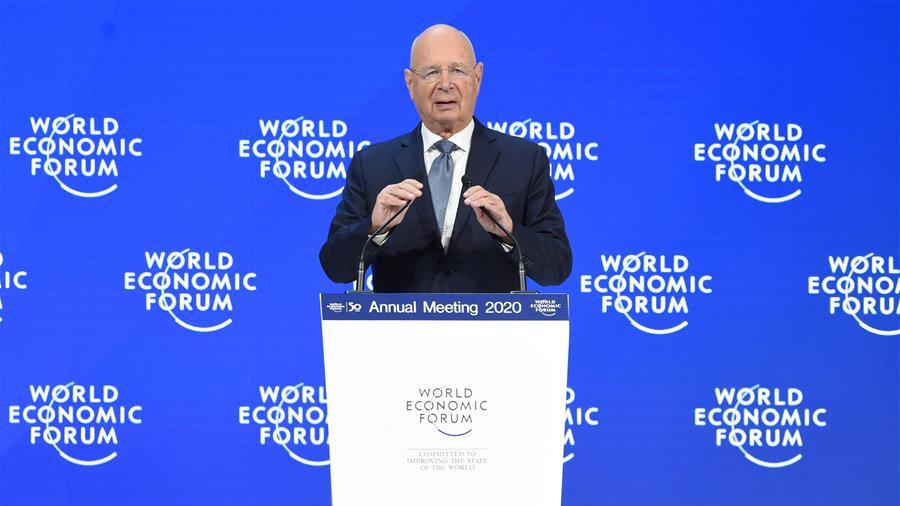
Klaus Schwab, founder and executive chairman of the World Economic Forum (WEF), speaks at the WEF annual meeting in Davos, Switzerland, January 21, 2020. /Xinhua Photo
Klaus Schwab, founder and executive chairman of the World Economic Forum (WEF), speaks at the WEF annual meeting in Davos, Switzerland, January 21, 2020. /Xinhua Photo
Editor's Note: Ji Xianbai is a research fellow with the International Political Economy Program of S. Rajaratnam School of International Studies, Nanyang Technological University, Singapore. The article reflects the author's opinions, and not necessarily the views of CGTN.
The management theory of "stakeholder capitalism" first fashioned in the 1950s is making a historic comeback in 2020. The idea of a business focusing on the interests of all stakeholders, including customers, suppliers, employees, and local communities, was enshrined as the key word for this year's World Economic Forum (WEF) Annual Meeting in Davos, themed "Stakeholders for a Cohesive and Sustainable World."
The WEF believes "stakeholder capitalism" is the solution to sustainability issues brought about by the prevailing profit-maximization, market-fundamentalist economic model.
A key foundation of "stakeholder capitalism" is corporate social responsibility (CSR) because companies are the most important agents in the marketplace. CSR is essentially a self-regulating business model, requiring companies to move away from profits by creating social and environmental problems, to making profits while making no harm, and ultimately towards a sustainable state of affairs in terms of solving societal problems in a profitable and entrepreneurial manner. In that process, a company will transform from being a profit-driven entity to a purpose-oriented one.
The purpose-driven mentality should be promoted across the globe. And finding a purpose is realistically achievable. A speaker at the WEF spoke of Novo Nordisk, a Danish pharmaceutical that produces insulin, that successfully elevated its CSR from making money by synthesizing insulin, to curing diabetes through its products, and is now a global champion of diabetes prevention.
In China, a recent example of business rediscovering its missions and purpose through exercising CSR is Alibaba. By a narrow definition, Alibaba is an e-commerce company that makes money from business transactions it facilitates and enables.
The sustainability or the wider social impact of those transactions per se were not necessarily its concern. But Alibaba, like Novo Nordisk, leveraged its technological expertise to address common sustainability challenges. In 2016, Alibaba introduced an innovative scheme called Ant Forest on Alipay, the company's mobile payment platform.

Klaus Schwab, founder and executive chairman of the World Economic Forum (WEF), speaks at the WEF annual meeting in Davos, Switzerland, January 21, 2020. /Xinhua Photo
Klaus Schwab, founder and executive chairman of the World Economic Forum (WEF), speaks at the WEF annual meeting in Davos, Switzerland, January 21, 2020. /Xinhua Photo
Alipay users grow a virtual tree and accumulate "green energy points" each time they opt for a more sustainable way of life like taking public transport, going paperless at work and paying utility bills online. Alibaba then matches the efforts of its e-wallet users by planting real trees to reverse desertification in vulnerable landscapes or protect a conservation area. Alibaba's CSR has been recognized by the United Nations for offering "a new way to mobilize people to engage in solving local and global problems."
As private companies scale up sustainability actions through CSR, governments must also take the issue of sustainability on board when making policy decisions. In other words, government social responsibility (GSR) is also required to complement CSR to put us on a path towards a more sustainable future.
To the extent that the CSR proves effective in addressing climate-related sustainability issues, GSR is best placed to make meaningful inroads against socio-economic ills plaguing societal sustainability. Just prior to the WEF annual meetings in Davos, new reports released by the WEF and Oxfam painted a bleak picture of astonishing income gaps, gender inequality and social immobility in the world. The Oxfam found that the richest one percent in the world have more than double the wealth of 6.9 billion people. This is clearly shocking and unsustainable. In a critical sense, the yellow vests movement in France has already presented itself as a stark warning to the world.
Facing such daunting social sustainability challenges, government should shoulder its GSR more resolutely. To put GSR into practice, the WEF has recommended that government should invest, among others, in health, education (including life-long learning), fair taxation and wage systems, and social protection safety net. Politics and policies need to be more responsible and inclusive, but guarding against the danger of descending to populism and political nativism is equally essential.
The 50th anniversary of the WEF annual meeting has brought the idea of "stakeholder capitalism" back to life. CSR and GSR are both needed to translate the idea into reality and bring long-term benefits to the environment as well as human beings.
(If you want to contribute and have specific expertise, please contact us at opinions@cgtn.com.)